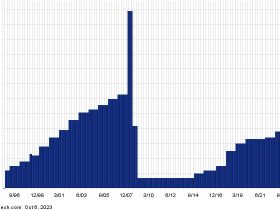Former Pimco “bond king” Bill Gross made headlines this past Monday at a California conference by saying that Jeffrey Gundlach doesn’t manage enough money at DoubleLine to deserve that title. Gundlach, who appeared on Tuesday, briefly took the high road. “Who?” he asked. “I just don’t care.” Then he fired: “It’s odd that someone who has been out of the business for 10 years is still trying, I guess, to exorcise [their] demons.”
Lost in the hubbub was something more interesting: their investment ideas. Gundlach pitched commercial mortgage-backed securities, floating-rate loans, and long-duration bonds. All of it made sense.
Gross said that 40% of his stock portfolio is in master limited partnerships, which mostly own oil and natural gas pipelines and typically pay hefty dividends. The
Alerian MLP
exchange-traded fund yielded 7.9% over the past 12 months, while a Gross
MLP
holding,
Energy Transfer,
has a nearly 9% dividend yield. Investors can also defer taxes on distributions until the MLP is sold, he noted. That can be a long time.
MLPs come with a warning. They were hot in 2014, when energy prices were rising and they were sold as “toll roads” that would always do well. That wasn’t true—the Alerian ETF fell 26% in 2015, and it returned just 0.7% annually over the past 10 years. Returns have improved: 39% in 2021, 26% in 2022, and 15% this year. That beats name-calling.
Write to Ben Levisohn at [email protected]
Last Week
Markets
Stocks opened the week mixed, as tech stocks fell despite
Apple’s
introduction of the iPhone 15. Headline consumer prices ticked up in August, mostly on rising oil prices, and the IPO market stirred, but auto workers walked out, and a government shutdown threat cast a shadow. On the week, the Dow industrials inched up 0.12%, the S&P 500 fell 0.16%, and the Nasdaq Composite dropped 0.39%.
Companies
Talks failed to produce a labor deal, and 27,000 United Auto Workers walked out at selected
General Motors,
Ford, and
Stellantis
plants.
Walt Disney
and
Charter Communications
ended their cable-TV spat with a new accord. The antitrust clash between the Department of Justice and
Alphabet’s
Google began in Washington federal court. And The Wall Street Journal reported that
Meta Platforms
is working on an artificial-intelligence project to rival OpenAI’s.
Deals
The IPO of
SoftBank Group’s
Arm Holdings
unit priced at the top of its range. Shares rose, giving it a $65 billion valuation for now. Instacart, debuting this coming week, hopes for a valuation of $8.6 billion to $9.3 billion; Birkenstock filed, as well…
J.M. Smucker
announced a deal to buy Hostess Brands (think Twinkies) for $5.6 billion….U.S.-based WestRock agreed to a $20 billion merger with Ireland’s
Smurfit Kappa,
creating a global packaging powerhouse…Bloomberg reported that media mogul Byron Allen made a $10 billion bid for Disney’s ABC TV network and related assets.
Write to Robert Teitelman at [email protected]
Next Week
Wednesday 9/20
The Federal Open Market Committee announces its monetary-policy decision. Wall Street is nearly unanimous in expecting the FOMC to hold the federal-funds rate steady at 5.25% to 5.50%. By year end, there is roughly a 40% chance of a quarter of a percentage point rate increase, bringing the federal-funds rate to 5.50%-5.75% according to the CME FedWatch Tool.
Thursday 9/21
A busy week for central banks around the globe continues with the Bank of England, Sweden’s Riksbank, and the
Swiss National Bank
all announcing their monetary-policy decisions. With European inflation proving more stubborn than most developed economies, those central banks are expected to raise their key interest rates by a quarter of a percentage point. In contrast, the
Bank of Japan,
which announces its decision on Friday, is seen keeping its target rate unchanged at negative 0.1%.
Friday 9/22
S&P Global
releases both its Manufacturing and Services Purchasing Managers’ indexes for September. Consensus estimates are for a 47.8 reading for the Manufacturing
PMI
and a 50.3 reading for the Services PMI. Both figures are roughly even with the August data, reinforcing the fact that the services sector continues to hold up better than the manufacturing sector.
Email: [email protected]
Read the full article here









Leave a Reply